Search
for
Sort by
Research
600-630 / 818 resultsresearch Eyebrow Alopecia: Centrofacial Trichoblastomatosis
Recognizing eyebrow hair loss linked to a rare skin condition is crucial for proper treatment.
research Incomplete Sjögren-Larsson Syndrome in Two Japanese Siblings

research Role of Autologous Micrografting Technology Through Rigenera System in the Treatment of Androgenetic Alopecia
Autologous micrografting via the Rigenera® system shows promise in improving hair loss treatment.
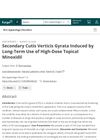
research Secondary Cutis Verticis Gyrata Induced by Long-Term Use of High-Dose Topical Minoxidil
Long-term use of high-dose topical minoxidil can cause thickened, ridged scalp.

research Sisaipho Revisited: Inverse Ophiasis or More Than That?
Alopecia areata can look like male or female pattern hair loss, needing a new subtype for better diagnosis and treatment.
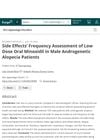
research Side Effects’ Frequency Assessment of Low Dose Oral Minoxidil in Male Androgenetic Alopecia Patients
Low dose oral minoxidil is safe for treating hair loss in men.

research The 100 Most Cited Androgenetic Alopecia Articles: An Analysis of Altmetrics Data from 2015 to 2022
Healthcare professionals are selective in reading, while the public struggles to find reliable dermatology sources.
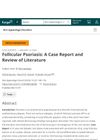
research Follicular Psoriasis: A Case Report and Review of Literature
A man with follicular psoriasis got better after treatment with skin cream and allergy pills.
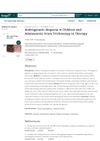
research Androgenetic Alopecia in Children and Adolescents: From Trichoscopy to Therapy
The article discusses ways to diagnose and treat hair loss in young people.

research Hair-To-Hair Trichoscopy: An Objective Method To Assess Effectiveness Of Botulinum Toxin In A Clinical Trial For Androgenetic Alopecia
Trichoscopy, a method of examining hair, can objectively measure how well botulinum toxin works for hair loss treatment.
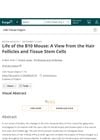
research Life of the B10 Mouse: A View from the Hair Follicles and Tissue Stem Cells
Mice skin matures by day 200, leading to aging signs like curved hair follicles and white hairs due to changes in skin stem cells.
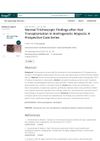
research Normal Trichoscopic Findings After Hair Transplantation in Androgenetic Alopecia: A Prospective Case Series
Hair transplants in male pattern baldness typically look normal under a microscope.
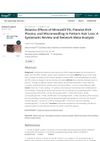
research Relative Effects of Minoxidil 5%, Platelet-Rich Plasma, and Microneedling in Pattern Hair Loss: A Systematic Review and Network Meta-Analysis
Minoxidil, platelet-rich plasma, and microneedling all help with pattern hair loss, but their effectiveness varies.
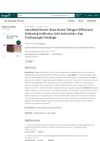
research Localized Donor Area Acute Telogen Effluvium Following Follicular Unit Extraction: Key Trichoscopic Findings
Hair loss can occur in the area where hair was taken for a transplant.

research Plica Neuropathica in Two Hispanic Patients
Two Hispanic women developed Plica neuropathica, a condition causing tangled hair, possibly due to hair damage and various risk factors.

research Trichoscopic Findings Post Hair Restoration Surgery
Hair restoration surgery can change the appearance of hair when examined with a special magnifying tool.
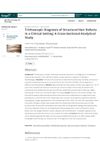
research Trichoscopic Diagnosis of Structural Hair Defects in a Clinical Setting: A Cross-Sectional Analytical Study
Special scalp and hair examination techniques can identify hair problems.
research Development and Validation of a Dermoscopic Severity Score for Female Pattern Hair Loss
A reliable severity score for female pattern hair loss was developed and validated.
research Patterned Trichoteiromania in Androgenetic Alopecia
Self-induced hair loss should be considered in patients with androgenetic alopecia.
research Erosive Pustular Dermatosis of the Scalp
Topical steroids can manage chronic scalp pustules in elderly women.
research Long-Term Follow-Up of Leucoderma Patients Treated with Transplants of Autologous Cultured Melanocytes, Ultrathin Epidermal Sheets, and Basal Cell Layer Suspension
Transplantation is effective for stable leucoderma but not for progressive, widespread vitiligo vulgaris.
research Follicular and Epidermal Alterations in Patients Treated with ZD1839 (Iressa), an Inhibitor of the Epidermal Growth Factor Receptor
ZD1839 (Iressa) causes skin and hair side effects, treatable with tretinoin cream and minocycline.
research Frontal Fibrosing Alopecia: A Clinical Review of 36 Patients
Hydroxychloroquine effectively reduces symptoms of frontal fibrosing alopecia, especially in the first 6 months.
research A Novel Use of Spironolactone: Treatment of Hirsutism
Spironolactone is effective in treating excessive hair growth in women.
research Thyroid Hormone Receptor β1 Is Expressed in the Human Hair Follicle
Thyroid hormone receptor β1 is found in human hair follicles and helps them survive.
research Vitamin D Deficiency in Alopecia Areata
Alopecia areata patients often have low vitamin D levels, suggesting they might benefit from vitamin D supplements.
research PUVA Treatment of Alopecia Areata Partialis, Totalis, and Universalis: Audit of 10 Years' Experience at St John's Institute of Dermatology
PUVA treatment is generally ineffective for alopecia areata.
research Intralesional Treatment of Alopecia Areata with Triamcinolone Acetonide by Jet Injector
Triamcinolone acetonide injections help hair regrow quickly in mild alopecia but not in severe cases.
research Lipid Analysis of Follicular Casts from Cyanoacrylate Strips as a New Method for Studying Therapeutic Effects of Anti-Acne Agents
The method effectively measures lipid changes and drug effects on skin follicles.